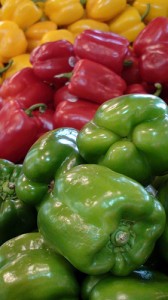
Already an experienced cook who had taught herself to use ingredients that she was growing in her own backyard, Angelova came to the Institute as with a lot more experience in sustainable cooking and eating than many of her peers. Most of the food Angelova eats comes from her own garden. She composts her food scraps and has a tendency to “bore [her] friends with long discussions about soil composition and how to make marshmallows from scratch.”
But she wasn’t always so comfortable getting her hands dirty . Growing up in her parents’ house in Brooklyn, “everything in the pantry could survive a nuclear disaster,” says Angelova. And for a long time, Angelova was perfectly happy eating that way. “All my food was all out of a box and processed, but it was all I knew and all I wanted to eat.”
“Basically, I was perfectly happy eating out of a box until I met my now husband who encouraged me to try new things,” says Angelova. “I would go grocery shopping and be surprised when I couldn’t find broccoli in June,” said Angelova. “I was already on my way to being a bit of a foodie when I left the United States, but when I got to Bulgaria I was really smacked in the face with seasonality.”
But instead of being defeated by what she initially saw as a lack of ingredients, Angelova was inspired by her new relationship with local and seasonal foods. “One thing I really missed was brown sugar so I was buying it in the states and sending it to myself in Bulgaria, but that didn’t make any sense so I started just making it from scratch. Then I started a garden and the whole thing escalated from there.”
Now, as a student at CIA, Angelova is involved with the Slow Food USA chapter on campus and is actively helping her peers to appreciate locally produced foods and more sustainable food production methods. She also has her own blog, Eating, Gardening and Living in Hyde Park, and plans, after graduation, to open a completely sustainable restaurant and hotel with a farm and vineyard in Bulgaria. “I want people to come be on the farm and get involved and then eat food made from the ingredients that they helped to cultivate,” she says.
Unfortunately, in Bulgaria, it’s a sign of wealth to eat processed and imported foods. “To the nouveau riche, basically, the whole agriculture thing equals poverty,” says Angelova. Angelova hopes that her business will help make locally sourced and produced food appealing to consumers in Bulgaria.
“Educating people and getting them interested in things like recycling and compost and local food sounds simple but it’s a slow process,” says Angelova. “For the most part people already know this stuff, but they need to really understand why they should change their bad habits.”
The CIA’s program is helping to do this, says Angelova, by getting the students so involved in every aspect of food preparation, from cultivation to processing to disposing and recycling. “When you develop a relationship with the entire process,” says Angelova, “it’s really hard to go back to eating out of a box.”
Molly Theobald is a research fellow with the Nourishing the Planet project.

Danielle Nierenberg, an expert on livestock and sustainability, currently serves as Project Director of State of World 2011 for the Worldwatch Institute, a Washington, DC-based environmental think tank. Her knowledge of factory farming and its global spread and sustainable agriculture has been cited widely in the New York Times Magazine, the International Herald Tribune, the Washington Post, and
other publications.
Danielle worked for two years as a Peace Corps volunteer in the Dominican Republic. She is currently traveling across Africa looking at innovations that are working to alleviate hunger and poverty and blogging everyday at Worldwatch Institute’s Nourishing the Planet. She has a regular column with the Mail & Guardian, the Kansas City Star, and the Huffington Post and her writing was been featured in newspapers across Africa including the Cape Town Argus, the Zambia Daily Mail, Coast Week (Kenya), and other African publications. She holds an M.S. in agriculture, food, and environment from Tufts University and a B.A. in environmental policy from Monmouth College.








